
Malaysia will take action against an international school for spreading "anti-palm oil propaganda", the education ministry said on Wednesday, in a sign of Kuala Lumpur's aggressive efforts to defend a big agricultural export.
Malaysia, the second-largest palm oil producer after Indonesia, has been increasingly vocal against criticism from Europe that the cultivation of the crop has resulted in deforestation and wildlife habitat destruction.
Authorities said they would take action against an international school under education laws after a video, which was circulated widely this week on social media, showed students talking on stage about the decrease in the number of orangutans due to the production of palm oil.
"The involvement of students in propaganda activities are in direct conflict with national policy and can affect the good name of the country," Amin Senin, secretary-general at the education ministry, said in a statement.
The ministry did not identify the school nor specify what action would be taken against it.
Primary Industries Minister Teresa Kok said on Tuesday that the school was promoting "hateful thoughts" toward the palm oil industry, according to media reports.
Malaysia relies on palm oil - a commodity used in everything from chocolate spread to lipstick - for billions of dollars in foreign exchange earnings and hundreds of thousands of jobs.
This year, Prime Minister Mahathir Mohamad said the European Union risked opening a trade war over its "grossly unfair" policies aimed at palm oil.
The bloc finalised a law this year that would phase out the use of palm oil in transport fuel by 2030.
Malaysia and Indonesia threatened to raise a World Trade Organisation challenge after the European Commission determined that palm oil has resulted in excessive deforestation and that it should no longer be considered a renewable transport fuel.
Large areas of Southeast Asia have been cleared of forest and replaced with endless rows of palm oil. The clearing of forest by fire also contributes to air pollution.








